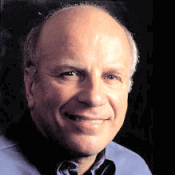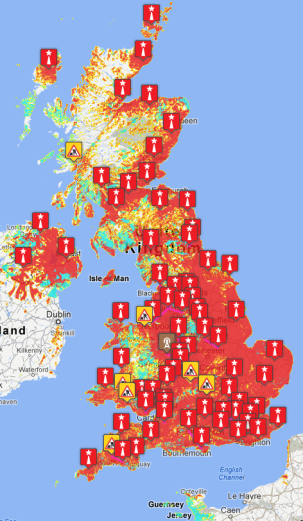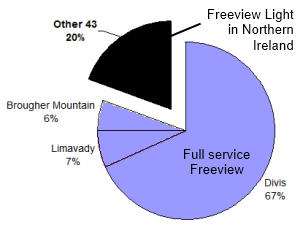Will there ever be more services on the Freeview Light transmitters?
 Brian Butterworth published on UK Free TV
Brian Butterworth published on UK Free TV The digital terrestrial service that is known today as Freeview, started life in Parliament as the Broadcasting Act 1996.
Part I act gave the regulator, then the Independent Television Commission, the authority to establish digital terrestrial television services in the UK, and paved the way for a "six multiplex" service. One multiplex was reserved for the BBC, a second jointly between the "Channel 3 licence holder", Channel 4, Gaelic programming in Scotland plus Teletext UK as the "national teletext provider"
One half of the third multiplex was passed to Channel 5 and the S4C Corporation, with the remaining three and a half being put up for a public auction. The ITC duly awarded the remaining three multiplexes to "British Digital Broadcasting" in 1997, which was a combination of two big ITV companies at the time, Carlton and Granada.

On Sunday 15th November 1998, the services was launched under the name "ONdigital", a mixture of free-to-air and pay services, and rather dwarfed by the launch six weeks earlier of the much superior Sky Digital service.
ONdigital renamed itself ITVdigital on 11th July 2001, but the woollen monkey toy in the adverts proved more popular than the service, and the service closed on 1st May 2002.
 It became clear (especially to BBC director-general Greg Dyke, pictured right) that the digital terrestrial service was popular with viewers, but it was unsuitable as a pay-TV platform.
It became clear (especially to BBC director-general Greg Dyke, pictured right) that the digital terrestrial service was popular with viewers, but it was unsuitable as a pay-TV platform.
 ITVdigital handed back three multiplex licences to the ITC, and the ITC then re-awarded one to the BBC and the other two to Crown Castle International, a company formed when the BBC's engineering division was sold off.
ITVdigital handed back three multiplex licences to the ITC, and the ITC then re-awarded one to the BBC and the other two to Crown Castle International, a company formed when the BBC's engineering division was sold off.
A company, DTV Services, formed to publicise the new service, which was now called Freeview.
Sky joined in, and purchased slots on the new service (from CCI) for Sky News, Sky Sports News and Sky Travel. Also there from the start of Freeview was Flextech Television "ftn", music channel TMF, UKTV's UK History and UK Bright Ideas, and shopping channel, QVC
Digital switchover process
When it was decided that the analogue television signals would be turned off, the BBC, as it funded by a universal fee decided that it must provide the two multiplexes of services to all homes. Ofcom, now the regulator, decreed that the multiplex shared by Channel 3 and Channel 4 (called "Digital 3 and 4 Ltd") must also provide service to all homes that had analogue. This was because Channel 4 already provided this level of coverage, and as the licence holder for Channel 3 has "public service obligations", the broadcasting of multiplex 2 should also extend to all existing TV masts.
Ofcom, now the regulator, decreed that the multiplex shared by Channel 3 and Channel 4 (called "Digital 3 and 4 Ltd") must also provide service to all homes that had analogue. This was because Channel 4 already provided this level of coverage, and as the licence holder for Channel 3 has "public service obligations", the broadcasting of multiplex 2 should also extend to all existing TV masts.
However, for the commercial multiplexes, Ofcom simply invited Crown Castle Ltd and S4C Digital Networks (SDN) to apply to extend their networks. Ofcom, having granted the multiplex licences already, felt it had no legal power of compulsion to insist more homes were served, and in December 2006 announced that no application had been received - at this point Ofcom no longer planned for additional frequencies for the commercial multiplexes.
Both commercial operators decided that the cost of providing the equipment, installation and ongoing operation of services from the 1,000 smaller transmitters would cost more than any additional revenue they could get from the TV channels that rent their broadcast capacity, as the work would only expand the actual number of homes broadcast to by 9%.
Since this time, S4C Digital Networks multiplex was bought by ITV plc, and Arqiva acquired the CCI multiplexes. For this reason the commercial multiplexes are known as SDN, ArqA and ArqB.
 The map shows the locations where Freeview Light service is generally the only Freeview reception option.
The map shows the locations where Freeview Light service is generally the only Freeview reception option.
See also: Where are the public service (Freeview Light) transmitters?
10:55 PM
Mark A: Sewing Quarter are paying for their channel to be carried on PSB2. It isn't down to Ofcom to decide which channel goes on which multiplex, it is a commercial decision between the broadcaster and multiplex operator and there are certainly no legal grounds for Ofcom to force a channel to move to another mux.
| link to this comment |
1:08 AM
If the 'universal' funding for the BBC is stopped due to public disillusionment with the BBC's apparent lack of neutrality, does anyone have thoughts on what would happen to the terrestrial transmission service?.
| link to this comment |
9:24 PM
Usk
I have been at my current address (NP15 1SR, number 9) for about 3 months now and have noticed an increasing frequency of "drop-outs" in the DAB radio transmissions. I am also aware of increasing instances of the picture, and sound, freezing on TV transmissions. Are you able to offer any advice as to the cause of the DAB "drop-outs" and the TV freezing? I have noticed that my TV aerial is orientated for vertical polarisation whereas most of my neighbours have aerials oriented for horizonal polarisation. Is he Usk transmitter vertical or horizontal polarised?
| link to this comment |
Geoff's: mapG's Freeview map terrainG's terrain plot wavesG's frequency data G's Freeview Detailed Coverage
1:01 PM
ukfree.tv's own page on the Usk transmitter - Which Freeview channels does the Usk transmitter broadcast? - says it's horizontal.
I'm no expert but I thought if your aerial was out by 90 you would in theory receive no signal at all... maybe all you've been getting is from reflections (which can turn the polarity) and your drop-outs are due to disappearing reflections? Anyway, if you can safely get to the aerial, it sounds like it could be worth five minutes with a spanner!
| link to this comment |
1:17 PM
ukfree.tv's own page on the Usk transmitter - Which Freeview channels does the Usk transmitter broadcast? - says it's horizontal.
I'm no expert but I thought if your aerial was out by 90 you would in theory receive no signal at all... maybe all you've been getting is from reflections (which can turn the polarity) and your drop-outs are due to disappearing reflections? Anyway, if you can safely get to the aerial, it sounds like it could be worth five minutes with a spanner!
I also looked at the Digital UK predictor for your address - Coverage Checker - Detailed View - and it suggests you might also be able to pick up full Freeview service from the Mendip transmitter, even though it's 55km further away, and it's nearly the same direction from you, and also with horizontal polarisation.
| link to this comment |
3:23 PM
Geoff Punnet:
If you look at the Digital UK data for Usk it show it as Vertical and not horizontal. See Coverage Checker - Detailed View for details at your location. (John Robinson's information is not correct.)
Though you may get some signals from Mendip many of the channels will give very poor reception so cause more problems. Likewise, Wenvoe is closer but reception is predicted as being even worse than Mendip!
So it would be best, at present, to stay on the Usk transmitter with your aerial Vertical and not change it to horizontal. Your neighbours my betrying to get Mendip signals but probably suffering more problems that you are at present.
| link to this comment |
1:12 PM
No BBC channels at all TV or Radio. Everything else no problem on TV with integral Freeview. Went off last night
| link to this comment |
3:22 PM
Cat: Have you checked for any loose or damaged cables or connections behind your TV? Do not attempt to retune. As you haven't said which transmitter you're using we have no idea if there is an ongoing fault or engineering work taking place.
| link to this comment |
4:49 PM
Hello. I'm writing on behalf of my mother who lives in Bridport Dorset, and only receives a very limited selection of Freeview channels. Why is this? She would love to be able to watch Drama, Talking Pictures etc, ie nostalgia channels, as elderly and reliant on the telly for company. Is there any chance that there will be a digital upgrade for customers in places such as Bridport soon? Merry Xmas, Michael Hampton
| link to this comment |
4:57 PM
Michael Hampton:
That is because the Bridport transmitter is a 'Freeview Light' type. That is because the commercial broadcasters will not pay to have their programming broadcast from that transmitter, as with many others around the UK. Most of the commercial channels require there to be a 'return on investment' from any of their operations and if the area covered by a transmitter has too few potential customers for their advertising they will not pay to transmit.
There is little likelihood that any of those channels will change their policy in the future.
| link to this comment |